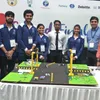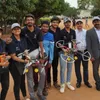Smart India Hackathon: Team Dhruva’s innovation sends an SOS in case of an accident
Six students from Nanded have designed a bike crash detector that sends an alert in case of a mishap, and also speeds up medical care. The team is also working on gathering data on bike riding parameters to avert problems.
Indian roads can be fatal. According to a report released by the government, in 2017 a total of 4,64,910 road accidents were reported, claiming 1,47,913 lives and injuring 4,70,975. Among the most high risk accidents are those involving lone bike riders. The Ministry of Road Transport and Highways’ data reveals that nearly 1.5 lakh bike accidents occur every year, and an average of 44,000 people are killed.
Worrying statistics that Team Dhruva’s prototype Cognitio, a bike crash detector with an SOS alert system, is aiming to change. Unveiled at the Smart India Hackathon 2019-hardware edition. Cognitio detects a crash, confirms it, and sends an SOS to a centralised command centre, getting emergency medical care swiftly. They presented their design at IIT-Delhi, which was among 19 nodal centres across India, and won a cash prize of Rs 75,000.

Team Dhruva's Cognitio detects a crash, confirms it, and sends an SOS to a centralised command centre, ensuring swift emergency medical care.
Behind the scenes
Shankar Biradar (21), Akshay Mirashe (22), Sarang Dondal (21), Swaraj Shingote (19), Shweta Dalal (20), and Mrunal Joshi (20) from Shri Guru Gobind Singhji Institute of Engineering and Technology in Nanded make up Team Dhruva. The team was led by Shankar Biradar.
All electronics and telecommunication engineering and mechatronics students, they have been working together on several projects that focus on improving living conditions in society.
“Two of us are in our final year. We formed Team Dhruva with four other third year students. Since all of us are passionate about engineering, we wanted to use it to help society,” says Akshay Mirashe.
The product is named Cognitio, as the bike crash detector is smart, intelligent, and investigative. With the problem statement, they firmly believed that a crash situation should be detected in a fool-proof way and had to be conveyed to a central location. They came up with this device to ensure quick emergency communication.

For preliminary research, Team Dhruva got in touch with a few bike accident survivors, and examined all possible dangers in-depth. Analysing each crash, they arrived at cautionary parameters such as hit, skid, and speed. Based on their research, they built the technology around sensors using an accelerometer, gyroscope and GPS. To send an emergency message, a GSM and a controller was used.
The working model
With Cognitio mounted on a bike, a crash can be easily ascertained. However, since crash detection does not necessarily signify risk to a biker, a confirmation of the crash is also processed. Emergency communication through an SOS alert is sent immediately.
“The entire device is fool-proof. We have tested a wide range of accident scenarios on a bicycle. Crash detection, confirmation, and communication have been functioning well. We also tested for any false detection, and no inaccurate cases were detected during tests,” Akshay says.
The equipment can also be incorporated into existing automobile Electric Control Units and Electronically Controlled System communications. “Our crash detection device can also be used as a stand-alone life-saver,” Akshay adds.
As is the case with a device with such sensors, innovating on Cognitio was not a smooth run. Initially, processing the detection and communication simultaneously was difficult. A change of controller solved the issue. Financial aid was scarce. However, the team sought help from their professor and also increased their personal contribution to manage the production expenses.
Currently, the device has been designed using readymade modules. With mass production, the estimated cost is Rs 1,000. The team plans to use generic components, and reduce its size to make it cost-effective. The end goal for Cognitio is to be a low-cost and fool-proof device that saves lives, unlike other similar products.
Big plans for the future
The team is also working on developing a device to detect the driving behaviour of a biker.
“First, a driver’s behavior will be segmented into three parts: safe, moderate, and unsafe. The data will be analysed, and information regarding crashes will be provided to insurance companies as well. We are now working on the analysis,” Akshay says.
A team that has many innovative ideas running through their engineering brain, Team Dhruva also plans to research and collect data to map roads to assist drivers with early intimation of irregularities on roads, or speed breakers, etc. The end game? Building a startup is what these whiz kids are aspiring for.
(Edited by Suruchi Gomes Kapur)










![[YS Exclusive] Crypto startup BitSave bags Pre-Series A funding from Leo Capital](https://images.yourstory.com/cs/2/e4fd1d90231a11efb1991bdbfe47f5e7/BitSaveProfileTwitterPreview-1732553399768.jpg?mode=crop&crop=faces&ar=1%3A1&format=auto&w=1920&q=75)
